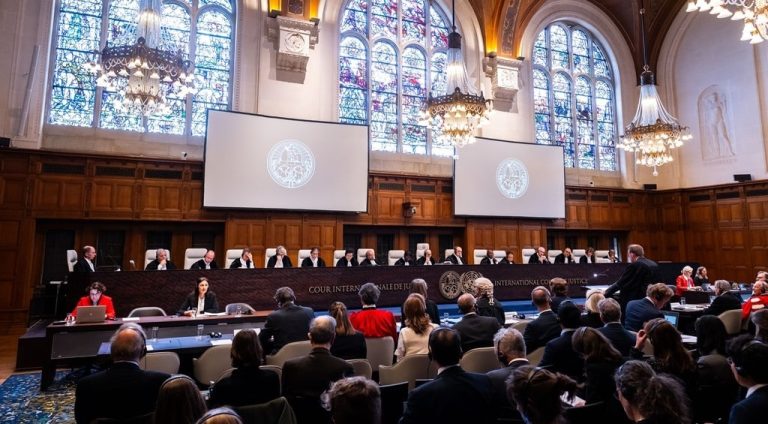1 de mayo 2024

Children of Exile: The Births “Sowing Hope” in the Camp of Nicaraguan Farmers

PUBLICIDAD 1M
PUBLICIDAD 4D
PUBLICIDAD 5D
The International Court of Justice rejects imposing precautionary measures against Germany for arms exports to Israel, as Nicaragua demandedHague Tribu

View of the International Court of Justice during the hearings of the case of Nicaragua against Germany, on April 9, 2024. Photo: ICJ
The International Court of Justice (also known as the World Court) rejected imposing precautionary measures against arms exports from Germany to Israel, as requested by the regime of Daniel Ortega in its lawsuit for “genocide” against the German state.
“Based on the factual information and legal arguments presented by the parties, the court concluded that, at this moment, the circumstances are not such as to require the exercise of its power under Article 41 of the statute to indicate provisional measures,” said the president of the court, Judge Nawaf Salam, in reading the decision on Tuesday, April 30, 2024.
The reading is part of a procedure initiated by Nicaragua in March 2024, in which it accused Germany of “complicity in genocide” in Gaza and demanded it “urgently suspend” its political, financial, and military support to Israel.
According to the Ortega regime, “Germany has provided political, financial, and military support to Israel knowing, at the time of authorization, that the military equipment would be used to commit serious violations of international law.”
Nicaragua claims that Germany is violating the 1948 UN Genocide Convention, established after the Holocaust.
Additionally, it denounces that Germany facilitates the commission of genocide in Gaza with the withdrawal of its funding to the United Nations Agency for Palestine Refugees (UNRWA).
The German government has rejected Ortega’s accusations and has stated that Managua “denies” Israel’s “right to exist.”
Salam explained that the court, which remains “deeply concerned about the catastrophic living conditions of the Palestinians,” adopted this decision by 15 votes in favor and one against.
The court emphasized that, according to Germany, 98% of the arms licenses granted since October 2023 pertain to other military equipment and not to weapons of war.
In any case, the judges considered it “especially important to remind all states” of their international obligations regarding the transfer of arms to the parties in an armed conflict, in order to “avoid the risk that such arms may be used” to violate the Geneva Convention or the Genocide Convention.
“All these obligations fall on Germany, as a party to the conventions, in its supply of arms to Israel,” they noted.
Regarding assistance to UNRWA, the court emphasized that these are voluntary contributions and that, according to the information provided by Germany, it should not make any new payments in the weeks following the announcement of its decision to suspend its funding.
Pending a complete resolution of the case, which could take years, the court stated that the decision rendered in the current procedure does not prejudge in any way the question of the court’s jurisdiction to hear the merits of the case nor any question relating to the admissibility of the claim or the merits themselves, and that it leaves intact the right of the governments of Nicaragua and Germany to submit allegations regarding these matters.
The World Court was created to resolve disputes between countries and has become a key element in the war between Israel and Hamas, which began with the attacks on October 7, 2023.
With information from EFE.
This article was published in Spanish in Confidencial and translated by Havana Times. To get the most relevant news from our English coverage delivered straight to your inbox, subscribe to The Dispatch.
PUBLICIDAD 3M
Confidencial es un diario digital nicaragüense, de formato multimedia, fundado por Carlos F. Chamorro en junio de 1996. Inició como un semanario impreso y hoy es un medio de referencia regional con información, análisis, entrevistas, perfiles, reportajes e investigaciones sobre Nicaragua, informando desde el exilio por la persecución política de la dictadura de Daniel Ortega y Rosario Murillo.
PUBLICIDAD 3D